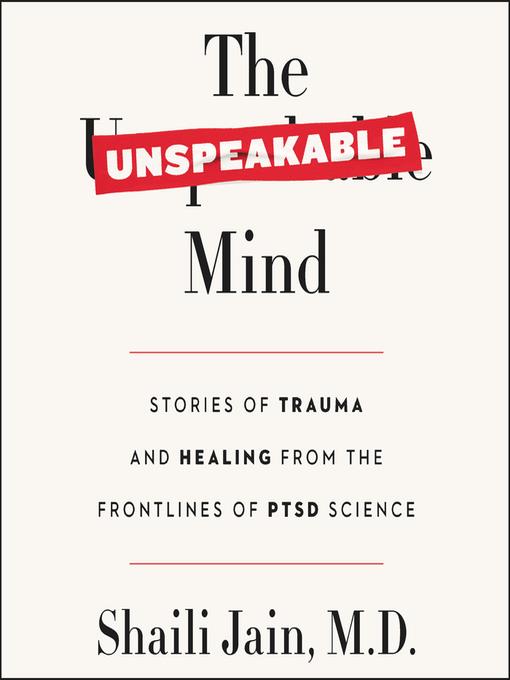
The Unspeakable Mind
Stories of Trauma and Healing from the Frontlines of PTSD Science
داستانهایی از تراما و التیام از خطوط مقدم علوم PTSD
کتاب های مرتبط
- اطلاعات
- نقد و بررسی
- دیدگاه کاربران
نقد و بررسی

April 15, 2019
Comprehensive survey of the state of knowledge concerning PTSD, woven into the author's experiences as a therapist and the child of survivors. Family memories of the partition of India and Pakistan fueled psychiatrist and PTSD researcher Jain's initial explorations of a condition marked by what she deems "five quintessential intrusive features"--namely, distress caused by memories of trauma, flashbacks, nightmares, unshakable waking thoughts, and physiological responses such as the feeling that one can't breathe or that death is imminent. The trauma that produces PTSD is life-transforming. The author writes that recent therapies have improved the outlook for some of those who suffer from PTSD, and she suggests, in a footnote to the ongoing nature vs. nurture controversy, that someone raised in a supportive family may well weather trauma better than someone in a conflict-ridden environment. Moreover, she adds, "the resilience of the wider community to which you belong has a knock-on effect of your own capacity, as an individual, to be resilient." When someone is not resilient, however, then trouble can lie ahead: PTSD sufferers tend to self-medicate, for instance, and their conditions are often misdiagnosed, so that when they are medicated pharmaceutically, it may well be with the wrong thing (benzodiazepines, in particular). Domestic violence, trouble with the law, suicide, and other negative consequences of PTSD are also commonplace. Jain carefully lays out what can be said with confidence about the syndrome--the fact, for instance, that "children with PTSD have altered neurobiology"--and what is more speculative, all with an eye to potential cures or at least effective therapies for managing the condition, such as recent British experiments with intensive residential treatments and the application of methods "with an emphasis on the fear and horror associated with the traumatic event." Given epidemic anxiety and stress disorders, this is a timely book that will greatly interest those who suffer from them as well as family members and medical practitioners.
COPYRIGHT(2019) Kirkus Reviews, ALL RIGHTS RESERVED.

May 13, 2019
Jain, a psychiatrist who specializes in PTSD, draws on her experiences working with sufferers of the disorder to outline a commonly misunderstood problem and its possible solutions. At a time when millions of Americans have suffered from trauma, this work sheds light on the symptoms of PTSD as well as the different types of treatment currently available, among which the “gold standard,” in her view, is cognitive behavioral therapy. Describing symptoms such as flashbacks and increased anxiety, Jain argues that “the goal of treatment should be to help survivors thrive in their new normal.” She also explores the diverse types of trauma that can lead to PTSD and related disorders, through stories from people she has treated. These include a woman traumatized by both her infant’s death from sudden infant death syndrome and by being blamed by her parents and ex-husband for the death, and a man whose memory of witnessing, over five decades before, a racially motivated assault suddenly manifests itself in late-onset stress symptomatology. This instructive resource can be recommended not only for those who have personal experiences with PTSD and trauma, but for anyone interested in learning more about the disorder and how it affects society.

April 15, 2019
Post-traumatic stress disorder (PTSD) is a challenging condition with a collection of possible symptoms?nightmares, relentless harmful emotions (anger, fear, guilt), hypervigilance, flashbacks, and an amplified startle response. PTSD patients are at greater risk of suicide. About 80-percent of the afflicted also suffer from other psychiatric problems (depression, alcoholism, drug abuse). Some causes of PTSD are rape, combat exposure, child abuse, accidents, and fire. Psychiatrist Jain (the daughter of immigrants from India with a family history of trauma) incorporates anecdotes of her patients to help explain the etiologies, diagnoses, and treatments of PTSD. A sampling includes a woman who is sexually assaulted as a teenager and later endures her baby's SIDS death, a marine who served in Iraq and witnessed a street bombing that maimed or killed many civilians, and an individual badly injured in a car accident. The best treatment remains talk therapy (cognitive behavioral therapy), and medication (chiefly SSRI antidepressants) can be beneficial. Jain asserts that the importance of accessible treatment and early intervention for PTSD cannot be overstated, while also emphasizing the genuine healing value of empathy and simply listening.(Reprinted with permission of Booklist, copyright 2019, American Library Association.)

























دیدگاه کاربران